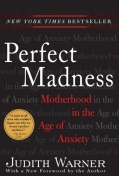BKMT READING GUIDES
Perfect Madness : Motherhood in the Age of Anxiety
by Judith Warner
Paperback : 352 pages
0 club reading this now
0 members have read this book
What is wrong with this picture? That's the question Judith Warner asks after taking a good, hard look at the world of modern ...
Introduction
A lively and provocative look at the modern culture of motherhood and at the social, economic, and political forces that shaped current ideas about parenting.
What is wrong with this picture? That's the question Judith Warner asks after taking a good, hard look at the world of modern motherhood-at anxious women at work and at home and in bed with unhappy husbands.
When Warner had her first child, she was living in Paris, where parents routinely left their children home, with state-subsidized nannies, to join friends in the evening for dinner or to go on dates with their husbands. When she returned to the States, she was stunned by the cultural differences she found toward parenting-in particular, assumptions about motherhood. None of the mothers she met seemed happy: Instead, they worried about the possibility of not having the perfect child, panicking as each developmental benchmark approached.
Combining close readings of mainstream magazines, TV shows, and pop culture with a thorough command of dominant ideas in recent psychological, social, and economic theory, Perfect Madness addresses our cultural assumptions, and examines the forces that have shaped them.
Working in the tradition of classics like Betty Friedan's The Feminine Mystique and Christopher Lasch's The Culture of Narcissism, and with an awareness of a readership that turned recent hits like The Bitch in the House and Allison Pearson's I Don't Know How She Does It into bestsellers, Warner offers a context in which to understand the way we live, as well as ways of imagining alternatives-actual concrete changes-that might better our lives.
The old adage is especially true for Perfect Madness: don't judge this eminently readable book by its stern and academic-looking cover. Judith Warner's missive on the "Mommy Mystique" can be read in a weekend, if readers have the time. Of course--according to the book--many would-be readers will have to carve out the hours in between an endless sea of child-enriching activities, a soul-sucking swirl that leads many mothers into a well of despair. Warner's book seeks to answer the question, "Why are today's young mothers so stressed out?" Whether shuttling kids to "enriching" after-school activities or worrying about the quality of available child care, the women of Perfect Madness describe a life far out of balance. Warner spends most of the book explaining how things got to this point, and what can be done to restore some sanity to the parenting process.
Warner draws her research from a group of 20- to 40-year-old, upper-middle-class, college-educated women living in the East Coast corridor. In other words, mirror images of Warner herself. Her limited scope has caused controversy and criticism, as have some of her more sweeping statements. (For example, Warner blames second-wave feminism--rather than corporate culture--for the many limitations women still experience as they try to balance the work-family dynamic.) Other favorite targets include the mainstream media, detached fathers, and controlling, "hyperactive" mothers who create impossible standards for themselves, their children, and the community of other parents around them. Warner begins and ends the book with a compelling argument for the need for more societal support of mothers--quality-of-life government "entitlements" such as those found in France. It's these big-picture issues that will provide the solution, she says, even if most mothers don't want to discuss them because they consider the topic "tacky, strident-sounding, not the point." In these sections on governmental policy, and also when she steps back, encouraging women to be kinder to each other, the author's warmth comes across easily on the page. Pilloried by some readers and supported by others, Warner should at least be applauded for opening up the Pandora's Box of American motherhood for a new generation. And if readers are of two minds about the issues raised Perfect Madness, as Warner sometimes seems to be herself, it's a fitting reaction to a topic with few easy answers. --Jennifer Buckendorff END
Discussion Questions
No discussion questions at this time.Book Club Recommendations
Recommended to book clubs by 0 of 0 members.
Book Club HQ to over 90,000+ book clubs and ready to welcome yours.
Get free weekly updates on top club picks, book giveaways, author events and more








